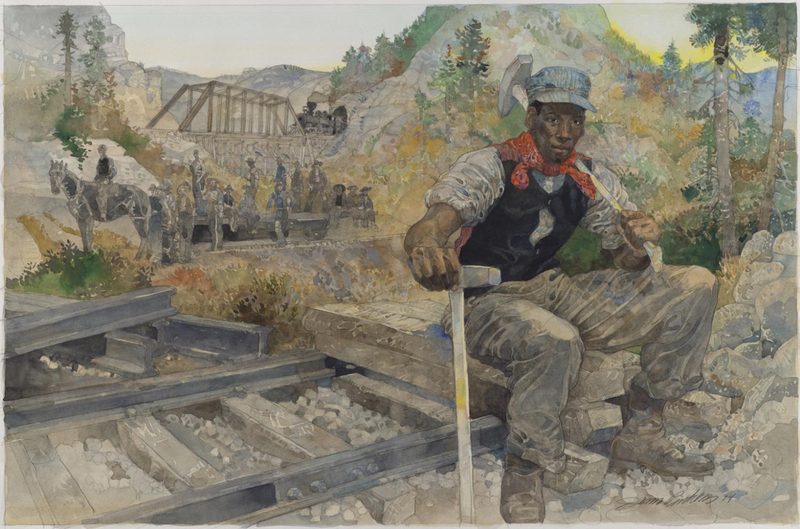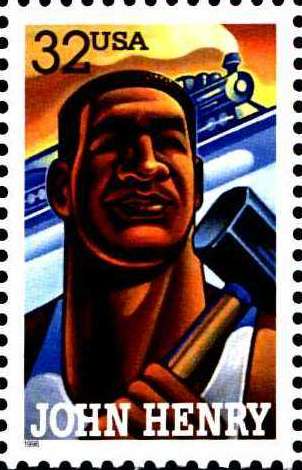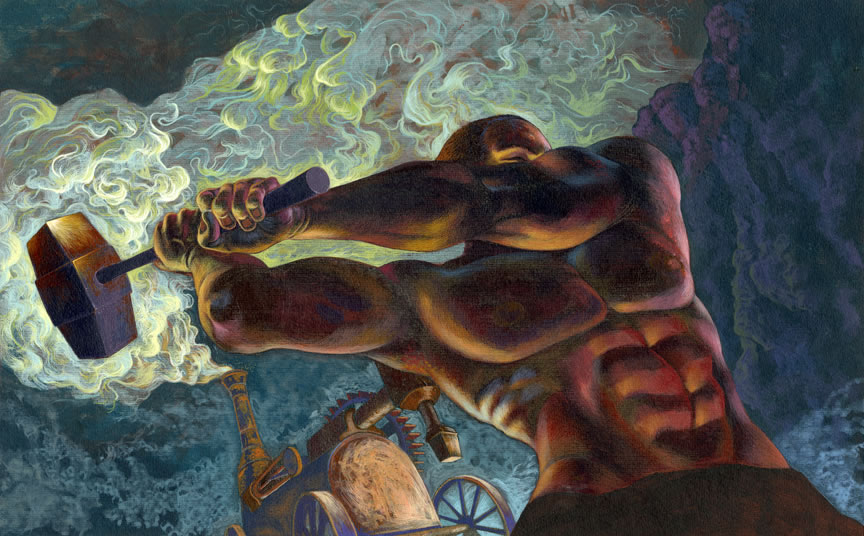Single Song Sunday: John Henry
(16 takes on an American myth from bluesfolk to gospelgrass)

We’re generally cautious about celebrating Black History Month here at Cover Lay Down. Though the earliest roots of modern folk recording and song surely include both the African-American experience and, more murkily, the origin stories of several of the instruments (including the dulcimer and banjo) which form the core of its acoustic array, the world of folk performance itself skews heavily towards caucasian artists, making any address of these roots unfinished without exhaustive exploration of the ways in which these roots have been claimed and shaped by white folks – from Lomax and Seeger to Paul Simon’s infamous Graceland controversy, Jayme Stone’s recent exploration of Gullah and other Caribbean sounds, and beyond.
But there are other ways, too, to celebrate the influence of Black America in the folkways. Today, in our first Single Song Sunday since our 2015 deconstruction of popular live performance encore The Weight, we tug at the roots of a particular story found in a broad panoply of songs: that of John Henry, a larger-than-life African American whose pride and persistence in the face of power and progress have come to represent the American spirit both within and beyond our shores.
 Ethnographic evidence compiled by Guy Johnson and Louis Chappel through interviews in the 1920s trace the particulars of well-known folksong hero John Henry to the 1870s, where workers in the West Virginia Mountains dug the biggest tunnel job attempted by man up to that date. And although more recent historians have proposed other digs as more plausible, all share a basic narrative: a single man, the best of many African-American convict laborers in a world still healing after the end of the Civil War, pits himself against the newly-introduced steam drill in a contest of strength and willpower…and wins in the end, though it takes his last breath.
Ethnographic evidence compiled by Guy Johnson and Louis Chappel through interviews in the 1920s trace the particulars of well-known folksong hero John Henry to the 1870s, where workers in the West Virginia Mountains dug the biggest tunnel job attempted by man up to that date. And although more recent historians have proposed other digs as more plausible, all share a basic narrative: a single man, the best of many African-American convict laborers in a world still healing after the end of the Civil War, pits himself against the newly-introduced steam drill in a contest of strength and willpower…and wins in the end, though it takes his last breath.
But the story above is no more or less true when Lomax places the the Old John trickster slave narrative at the heart of the song’s perpetual motion, nor when he notes, correctly, the melodic and lyrical similarities to tradtune The Lass Of Roch Royal in many versions of the song performed during his time. And it is certainly no more true than the abstract purpose of the song: to show the triumph of the underdog, of body and spirit through perseverance, and in doing so, iterate and reclaim those values which stir at the core of our identity as Americans.
Our myth comes to us wrapped around truth, in other words. And in the end, what matters isn’t whether it’s real, but whether it’s true. Like Johnny Appleseed and Paul Bunyan, the legend of John Henry lives in our hearts and bones: grounded in the real history of real human beings just a hair larger in life than their peers, conflated to serve the cultural need for heroes symbolic of the particular sort of stubborn pride and determination that moves mountains in the rich panoply of American mythology. Man vs. nature, man vs. technology, man vs. self, and man vs. society collapse into a single story. An American myth, if ever there was one.
And this is how, today, the song serves: as cultural approbation and fatalist’s morality tale, in which we may lose to our machines both political and real, but the indomitable human spirit prevails.
And as long as we are still in struggle, so must the song be sung.
 A plethora of songs recast the myth of John Henry. The Ballad of John Henry, for example – a standard in its own right – turns the morality of Henry’s death into a cautionary tale, pushing listeners to guard their life against the urge to spend it for foreman and fate; a “hammer song”, it is generally slow, but not always.
A plethora of songs recast the myth of John Henry. The Ballad of John Henry, for example – a standard in its own right – turns the morality of Henry’s death into a cautionary tale, pushing listeners to guard their life against the urge to spend it for foreman and fate; a “hammer song”, it is generally slow, but not always.
Not all recastings are covers, either. Modern troubadours from Songs:Ohia and Cuff The Duke to Drive-By Truckers and Driftwood Soldier have built from the ground up, applying the storyline to new tunes and lyrics, moving history into their own more immediate surroundings.
But do a simple search online of “John Henry”, and it’s clear that despite the mutability of over a dozen verses and perhaps ten times as many lyrical variants, one tune – paced and performed rhythmically, heavy on bravado and dialogue, that celebrates the man as myth for his determination even in death – remains dominant, even flush in the various byways of the folkworld. It drifts up to us from the earliest folk recordings, where it stands as a fieldhand blues number howled out in slackstring scratchy voices, filtered and reformed in a myriad of subgenres, from Leadbelly to Bill Monroe, through Doc Watson and The Stanley Brothers, John Renbourne and John Fahey, via John Jackson, Sonny Terry and Brownie McGee, Van Ronk and Guthrie and back again. (It is even familiar as an instrumental, especially with banjo and fiddle a la John Hartford or dulcimer a la Hazel Dickens and Alice Gerrard, though we’ll stick to the lyrical conceit today.)
Some favorites versions, then, of an old song, easy to play and sing, its renewed relevance ever on our tongues as we continue our fight against the machine. Join us as we flesh out a vast and varied set of and beyond the American range, from the high-intensity Appalachian bounce of The Mammals to The Downtown Shimmy’s harmonica-driven blues, from Snakefarm’s psychedelic funk to the frenetic energy of Del McCoury’s high tenor wail, from Chris Jones’ gospelgrass to French duo Lonesome Day’s slow walking blues, from Thomas Hellman’s chug-along Quebecois trainsong to the hoot and holler of new primitive Appalachian interpreter Lebo Jenkins, plus the neo-traditional feminist turn of Elizabeth LaPrelle, a deconstructed atmosphere from Daniel Dutton, and the regionally diverse and differentiated grit of American-and-beyond singer-songwriters and cultural ambassadors Eric Bibb, Willie Watson, Andrew Calhoun, Billy Bragg and Joe Henry, Tim O’Brien, and David Broad.
John Henry, Covered In Folk
A Single Song Sunday Mix [zip!]
- Tim O’Brien: John Henry [2017]
- Willie Watson: John Henry [2017]
- Billy Bragg & Joe Henry: John Henry [2016]
- Thomas Hellman: John Henry [2015]
- Eric Bibb: John Henry [2011]
- Lonesome Day: John Henry [2016]
- Del McCoury Band: John Henry [2012]
- Chris Jones: John Henry [1995]
- The Mammals: John Henry [2004]
- Lebo Jenkins: John Henry [2015]
- Andrew Calhoun: John Henry [2011]
- Snakefarm: John Henry [1999]
- The Downtown Shimmy: John Henry [2014]
- Elizabeth LaPrelle: John Henry [2011]
- David Broad: John Henry [2012]
- Daniel Dutton: John Henry [2004]
Always ad-free and artist-centric, Cover Lay Down has been exploring the ethnographic intersection of folkways and coversong since 2007 thanks to the support of artists, labels, promoters, and YOU. So do your part: listen, love, like, and above all, purchase the music, the better to keep it alive.
And if, in the end, you’ve got goodwill to spare, and want to help keep the music flowing? Please, consider a contribution to Cover Lay Down. All gifts go directly to bandwidth and server costs; all donors receive undying praise, and a special blogger-curated gift mixtape of over 50 well-loved but otherwise unshared covers from 2016-2017, including exclusive live covers from our very own Unity House Concert series.
2 comments » | Billy Bragg, Single Song Sunday, Tradfolk, Willie Watson
